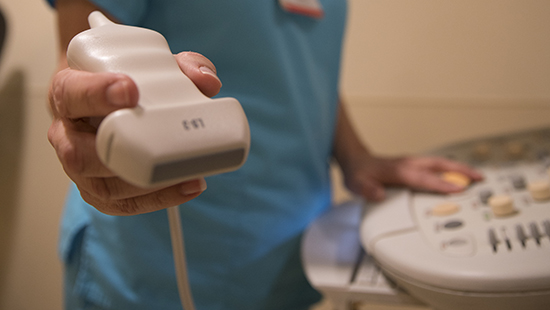Ultrasound

Ultrasound, or sonography, is a technique that uses sound waves to study and treat different areas of the body.
Its high-frequency sound waves are transmitted to the area of interest and returns echoes that are recorded and captured as images.
Ultrasound is non-invasive and does not involve radiation.
Because ultrasound images are captured in real-time, they can show the structure and movement of the body's internal organs, as well as blood flowing through blood vessels.
At University of Maryland Medical Center, both our medical imaging locations perform ultrasounds. However, most obstetric ones are done through Women's Health, though a few may be referred to us.
Please call 410-328-3225 to make your ultrasound appointment.
Reasons for Ultrasounds
While people are familiar with prenatal ultrasounds, it can be used on many other parts of the body to diagnose disease or evaluate organs. It can be used to detect kidney stones and tumors, and to evaluate masses in the thyroid.
In women, a pelvic or abdominal ultrasound is most often performed to evaluate the:
- Bladder
- Ovaries
- Uterus
- Fallopian tubes
In men, they may be used to evaluate:
- A mass in the scrotum felt by the patient or doctor
- Trauma to the scrotal area
- Testicular pain or swelling
MRI-Guided Focused Ultrasound
A minimally invasive technology for treating essential tremor, MRI-guided focused ultrasound uses brain imaging and heat-generating sonic waves to pinpoint and kill brain cells associated with the tremor.
What Happens During an Ultrasound
You will be lying on your back while a gel is applied to the area of the body being studied. The sonographer will then press the transducer firmly against the skin and move it back and forth over the area of interest. Several images are captured during the procedure. There may be a little discomfort from pressure as the transducer is pressed against the area being examined.
Ultrasound Preparation
Preparation will vary based on what area of the body is being studied. For instance:
- For a study of the liver, gallbladder, spleen and pancreas, you may be asked to eat a fat-free meal on the evening before the test and then to avoid eating for eight to 12 hours before the test.
- For kidney ultrasound, you will need to drink a minimum of 16 ounces of clear fluid at least one hour before your appointment and not empty your bladder.
- For aorta ultrasound, you need to avoid eating for eight to 12 hours before the test.
Please call 410-328-3225 if you have any questions about how to prepare for your ultrasound.
